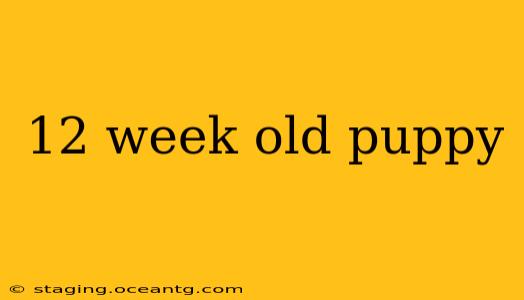Having a 12-week-old puppy is an exciting time! This is a crucial period in their development, a whirlwind of playful energy, boundless curiosity, and rapid learning. This comprehensive guide will cover everything you need to know about caring for your adorable, albeit sometimes challenging, new companion. We'll delve into their developmental milestones, training needs, health considerations, and common questions new puppy owners have.
What are the developmental milestones of a 12-week-old puppy?
At 12 weeks, your puppy is likely brimming with energy. They are transitioning from the purely playful phase to one where they begin to understand basic commands and social cues. Expect continued rapid growth, both physically and mentally. This is the prime time to start formal training and socialization. You'll see improved coordination and a growing understanding of their environment. They might also be exhibiting signs of independence, testing boundaries, and exploring their surroundings with newfound confidence.
What should I feed my 12-week-old puppy?
Feeding your 12-week-old puppy is vital for their healthy development. Consult your veterinarian to determine the appropriate food for their breed and size. High-quality puppy food, specifically formulated for their age, is crucial. Remember to follow the feeding guidelines on the packaging, adjusting portions based on their individual needs and activity levels. Avoid table scraps and unhealthy human foods, as these can lead to digestive upset and nutritional imbalances. Fresh water should always be readily available.
How much sleep does a 12-week-old puppy need?
Puppies at this age require significant amounts of sleep – often 18-20 hours a day! This sleep is crucial for their physical and mental development. Ensure they have a comfortable, quiet, and safe space to rest. Their sleeping patterns might be irregular, with short bursts of sleep throughout the day and longer periods at night. Avoid disturbing them excessively during their sleep cycles.
How do I potty train my 12-week-old puppy?
Potty training requires consistency and patience. Establish a regular schedule for feeding, playing, and potty breaks. Take your puppy out frequently, especially after waking up, after meals, and after playtime. Reward them immediately and enthusiastically with treats and praise when they eliminate outside. Clean accidents thoroughly using an enzymatic cleaner to remove the scent and prevent repeat offenses. Never punish your puppy for accidents, as this can be counterproductive.
What kind of socialization does my 12-week-old puppy need?
Socialization is crucial at this stage. Expose your puppy to a variety of sights, sounds, people, and other dogs in a positive and controlled manner. This helps them develop into well-adjusted adults, reducing the risk of fear-based aggression or anxiety later in life. Supervise all interactions carefully. Puppy classes can be an excellent way to provide controlled socialization experiences.
What are the signs of a healthy 12-week-old puppy?
A healthy 12-week-old puppy is bright, alert, and playful. Their coat should be shiny and clean, and their eyes and nose should be clear. Their stool should be firm, and their appetite should be good. Monitor them closely for any changes in behavior, appetite, or elimination habits. Consult your veterinarian immediately if you notice anything concerning.
What are some common health concerns for a 12-week-old puppy?
Common health concerns at this age include parasites (worms, fleas, ticks), infections, and vaccinations. Ensure your puppy receives age-appropriate vaccinations and parasite prevention treatments as recommended by your veterinarian. Regular veterinary checkups are essential for early detection and treatment of any potential health problems.
When should I start training my 12-week-old puppy?
Start basic obedience training as early as possible. 12 weeks is an ideal time to begin teaching commands like "sit," "stay," "come," and "leave it." Keep training sessions short, fun, and rewarding, using positive reinforcement techniques. Consistency and patience are key. Enroll in puppy classes for structured guidance and socialization opportunities.
How can I prevent separation anxiety in my 12-week-old puppy?
Separation anxiety is a common issue in puppies. Gradually acclimate your puppy to being alone by starting with short periods of separation and gradually increasing the duration. Create a safe and comfortable space for them, leaving them with toys and a chewable item to help them feel secure. Never punish your puppy for crying when left alone.
This guide provides a starting point for caring for your 12-week-old puppy. Remember that every puppy is unique, so adapt your approach based on their individual needs and personality. Regular communication with your veterinarian is crucial for ensuring your puppy's health and well-being. Enjoy this wonderful time bonding with your new furry friend!
